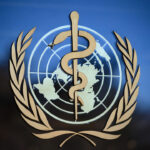
Nigerians Returning From Yuletide Holiday Isolated In U.S., Australia
After a six-week surge, Africa’s fourth pandemic wave driven primarily by the Omicron variant is flattening, marking the shortest-lived surge to date in the continent where cumulative cases have now exceeded 10 million, the World Health Organisation has said.
According to the global health body, as of 11 January, there have been 10.2 million COVID-19 cases in Africa, adding that weekly cases plateaued in the seven days to January 9, from the week before.
“Southern Africa, which saw a huge increase in infections during the pandemic wave, recorded a 14 per cent decline in infections over the past week. South Africa, where Omicron was first reported, saw a nine per cent fall in weekly infections. East and Central Africa regions also experienced a drop,” WHO said.
However, North and West Africa were witnessing a rise in cases, with North Africa reporting a 121 per cent increase this past week compared with the previous one.
The global heath body in a statement made available to The Guardian, said across the continent, though deaths rose by 64 per cent in the seven days ending on January 9, compared with the week before mainly due to infections among people at high-risk, deaths in the fourth wave were lower than in the previous waves.
“Hospitalisations have remained low. In South Africa, for instance, COVID-19 patients currently occupy around nine per cent of its over 5,600 intensive care unit beds. In countries experiencing a surge in cases, the fast-spreading Omicron variant has become the dominant type.”
WHO noted that while it took around four weeks for the Delta variant to surpass the previously dominant Beta, Omicron outpaced Delta within two weeks in the worst hit African countries.
“Early indications suggest that Africa’s fourth wave has been steep and brief but no less destabilising. The crucial pandemic countermeasure badly needed in Africa still stands, and that is rapidly and significantly increasing COVID-19 vaccinations. The next wave might not be so forgiving,” said Dr. Matshidiso Moeti, WHO, Regional Director for Africa.
Meanwhile, Nigerians living in Australia and America are currently being monitored by police and other agencies of their host countries to ensure that they (Nigerians) are confined within their premises for two weeks upon return from yuletide celebrations.
The Guardian learnt that their host countries’ resolve to ensure that the travellers do not transport the deadly Omicron variant of COVID-19 into their countries as they strive to contain the pandemic necessitated this measure.
According to sources, many Nigerians who visited the country during the yuletide were not allowed free movement in their host countries within two weeks of their arrival to ensure that they self-isolate.
A medical doctor, Madueke James, who spoke to The Guardian, yesterday, at the International Airport, Lagos, before living for Australia, said his wife had to go to the market to buy all the things they require for the two weeks to ensure that they do not run into trouble with the Australian police, which would be running a routine check on them to ensure that they do not step out of their homes.
He said any important item, which was not purchased by his wife before his arrival would have to be bought online and be delivered to his doorstep without any human contact with the delivery agent.
He said: “Once I get home now, none of my family members will be allowed to go out of my compound. In fact, we can’t go to church or market. My children will not go to school too. But luckily for me, they are on holiday till February 9, 2022.
“The police will be coming around within intervals to monitor us to ensure that we do not go any way until the two weeks elapse when we will conduct another test. The one we conducted was for us to get into the country first. And the test should be within 48 hours.
“I did mine at Awka, Anambra State capital, before I came to Lagos yesterday (Thursday) to catch up with my flight today. It’s not easy. Even when I was coming, some Immigrations officers were asking me why I was traveling this time. But I told them I had a mother to bury. And one of them said to me, what if you were not allowed back into the country? I told him, then, I will go to any country they want me to go to.”
In another development, US-based Nigerian, Ebenezer Godswill, said the same fate awaits them as they travel back to the States, saying they would be required to go for two weeks isolation before they could mix up with the rest of other citizens.
Ebenezer said: “From airport, I proceed straight to a hotel that I have booked for self-isolation. No going to church or work until the systems certify me okay. I won’t even go to meet my family.”
Mrs. Gladyce Okere, who was also traveling to US with her daughter, said she was prepared for the trouble, saying what she was going for was more important than the two weeks isolation with her teenage daughter.
“We will go into isolation as soon as we set our foot on the soil of the States,” she said.













